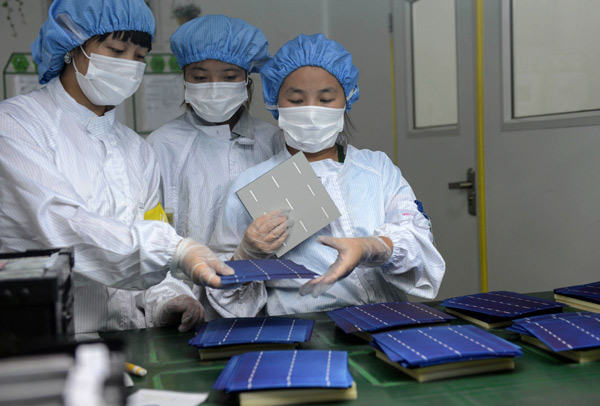Dialogue defuses EU, China solar case
Updated: 2013-08-06 06:47
By Li Jiabao (China Daily)
|
|||||||||||

|
 A quality inspector from a solar company in Hangzhou in Zhejiang province checks solar cell units. The Europe Commission endorsed a negotiated settlement with China that sets a minimum price and a volume limit on EU imports of Chinese solar panels through the end of 2015. Han Chuanhao / for China Daily |
High-level contacts helped two sides to resolve potentially damaging issue
The recent solar panel resolution between China and the European Union proved to be a good example of defusing trade frictions through high-level communications so much so that experts are now calling for a regular mechanism in resolving rising disputes.
"The settlement of the solar panel dispute cannot teach us too much. We should set up a specialized crisis management mechanism, incorporating trade agencies, enterprises and business representatives, to deal with rising trade frictions with the EU," said Feng Zhongping, vice-president of the China Institutes of Contemporary International Relations.
The European Commission, the EU's executive arm, on Saturday endorsed a solution setting a minimum price and a volume limit on EU imports of Chinese solar panels through 2015 that received almost unanimous support from member states. It also adopted a regulation exempting participating companies from paying any anti-dumping duties. Both legal acts came into force from Aug 6.
Shen Danyang, spokesman of the Ministry of Commerce, said the European Commission's decision marks the conclusion of procedures to resolve the solar case within the EU and is welcome in China, according to a statement on the ministry's website on Monday.
He added the settlement is in line with both sides' interests. Chinese solar exporters retained their market share in the EU, China's largest solar export market, through the price undertaking.
"We expect China and the EU will deal with trade frictions with an active, friendly, pragmatic and flexible stance, creating a favorable atmosphere for bilateral economic cooperation," Shen said.
The EU started anti-dumping investigations into solar panels from China in September 2012 and an anti-subsidy investigation into the same products in November 2012. The case is the largest trade investigation that the European Commission has launched with Chinese exports worth 21 billion euros ($27.9 billion) in 2011.
Starting from June 6, the Commission imposed provisional anti-dumping duties of 11.8 percent on imports of solar panels, cells and wafers from China until Aug 6, from when on the duty would be raised to 47.6 percent if the two sides had not been able to sort out the dispute through negotiation.
Chinese Premier Li Keqiang repeatedly expressed great concern about the case during his May visit to Europe and reiterated China's stance over a June telephone talk with European Commission President Jose Manuel Barroso.
"In view of the high export value in the solar case, the premier's efforts were worthy. But we should draw a lesson from the case about when high-level consultations should become involved in trade frictions and how to make them most efficient," said Long Guoqiang, director of foreign economic relations at the State Council Development Research Center.
He added the solar settlement was a positive active signal. Otherwise, China's solar industry would suffer fatal damage.
"Before the 28-member bloc escapes the debt crisis, the EU's trade frictions with Chinese exports will keep rising in view of the huge size of the trade between the two sides and the members' attempt to protect their own markets. In addition, Chinese exports also saw enhanced technological value and competitiveness, which increases the possibility of trade friction with the EU," Long said.
He noted that trade remedy measures only benefit some areas and cannot resolve all disputes. The involvement of high-level consultation in the solar case showed "very good results", compared with the two sides' conventional practice of resolving disputes through the World Trade Organization rules or bilateral dialogue mechanisms.
"In the future, we should attach sufficient importance to trade remedy investigations from the EU as early as possible, although the high-level communication eased the solar panel dispute at a crucial moment," said Li Gang, a researcher from the Chinese Academy of International Trade and Economic Cooperation.
lijiabao@chinadaily.com.cn
Related Stories
Pact with EU signals struggle for survival 2013-08-06 06:47
EU-China solar panel deal benefits world 2013-08-05 09:16
EU solar deal hailed as blueprint 2013-08-05 01:22
EU endorses solar deal with China 2013-08-02 21:28
Solar panel industry weighs the future 2013-08-02 08:56
Cloud lifts on solar panels 2013-07-31 09:07
Today's Top News
Dialogue defuses EU, China solar case
Washington Post sold to Amazon's founder
Fonterra says sorry for 'anxiety'
Obesity rate on the increase
Service sector drives up growth
Huawei expands in London
Web 'answer to export woes'
'Comfort women' issue still rankles
Hot Topics
Lunar probe , China growth forecasts, Emission rules get tougher, China seen through 'colored lens', International board,
Editor's Picks

|

|

|

|

|

|





